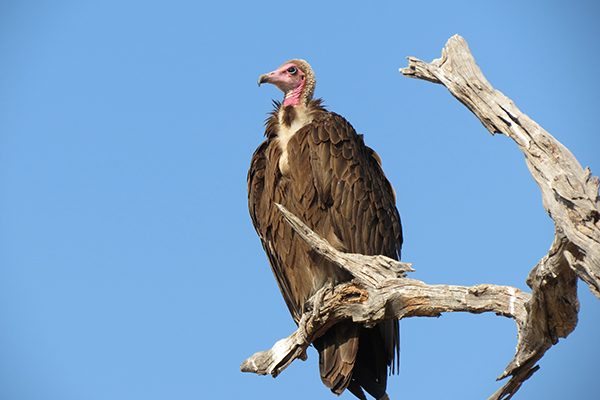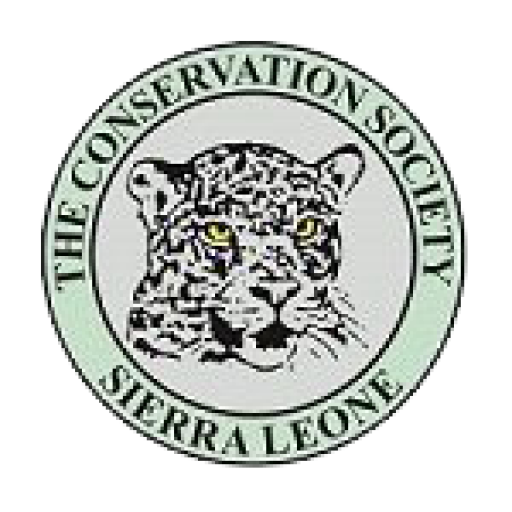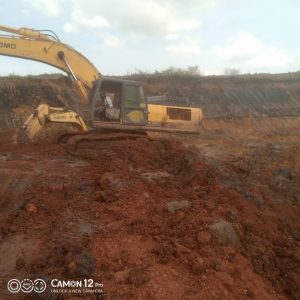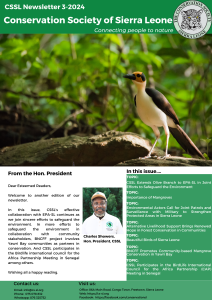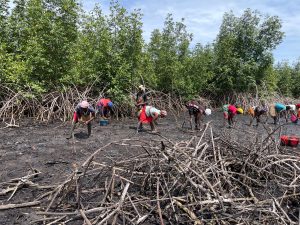In the night of May 24 2023 the iconic Cotton Tree in the center of Freetown fell in a storm. While the whole country and all Sierra Leonians around the globe were shocked by the photos from the destroyed tree, a second shock came: videos were circulating on social media showing people mistreating vultures which fell down from the tree and which were not able to escape. People started to slaughter these wonderful and especial birds.
This sad occasion inspired Mme Elizabeth L. A. Kamara, board member of CSSL, to write a poem for the Hooded Vulture – one of the globally threatened species in Sierra Leone.
Hands off our vultures
Hands off our vultures
Hands off we pray
Vultures are nature’s darlings
And yet endangered
Our environment we’ve destroyed
With hands that should build
And now we turn to vultures
Made homeless by the fall
Of our famous Cotton Tree
Do you not know that these scavengers
Are a valuable part of the ecosystem?
Do you not know that vultures are
Becoming extinct?
The White‐Backed Vultures
And Hooded Vultures of mama Salone
Are dwindling like the forest cover
“Nature’s Clean‐up Crew”
Wired to clean the environment
Help keep some diseases at bay
Do you know how the carcass
Of Mama Marie’s cat disappeared?
Pa Peter’s rat poison killed 12 rats
Where are they now?
Ask the natural cleansing agents
– Vultures
Fresh carcasses they consume,
But will devour rotten remains
And rid your bins and streets
Of stench of carcasses,
Reduce carbon emissions,
And eliminate some bacteria
You don’t have to pay or thank them
Unlike Masada
In peace, let’s leave the vultures
They pledge to make us comfortable
They pledge to protect us
They pledge to keep us healthy
Don’t cook our garbage cleaners
They’re here to do us a favour
The monumental tree has fallen
Let’s save the dispossessed vultures
(We once or twice were dispossessed too)
Let’s make a pact to preserve them
They deserve no less
Hands off our vultures.
by Elizabeth L. A. Kamara
The Hooded Vulture – some facts
The Hooded Vulture – Necrosyrtes monachus – is dark brown all over with bare head, throat and neck that is pink in adults. The bill is pointed and hooked. The wings are seen to be very broad in flight. The tail is short and rounded. The legs are brown.
Hooded Vultures are usually seen close to towns, cities and villages, singly or in small groups. They are often seen circling in the sky close to open-air markets, and over rubbish dumps and slaughterhouses (butchers). They can also be seen feeding on dead animals by the roadside or at rubbish dumps. When breeding, they make huge nests from dry sticks in tall trees and use them every year.
As you learn in the poem, vultures help keep our environment clean and reduce the risk of disease to man e.g., rabies from dogs, by eating dead animals and removing garbage.
The Hooded Vulture was quite common in Sierra Leone until recently, but it is now said to be “Critically Endangered” i.e., it can disappear completely in the next 20 years. More information about the status “critically endangered” on the website of the UICN Red List: https://www.iucnredlist.org/
In some parts of Sierra Leone, vulture parts are sold for use in traditional medicine. Also, birds are sometimes caught, cooked, and passed off as chicken for eating. These illegal activities are causing the numbers of birds to drop quickly.
Threats which are the reasons for the immense decline in numbers are:
- urban development
- agriculture and farming
- hunting and trapping
- logging and wood harvesting
- human intrusions in habitat
- ecosystem modifications through climate change
- viral and prion-induced diseases
